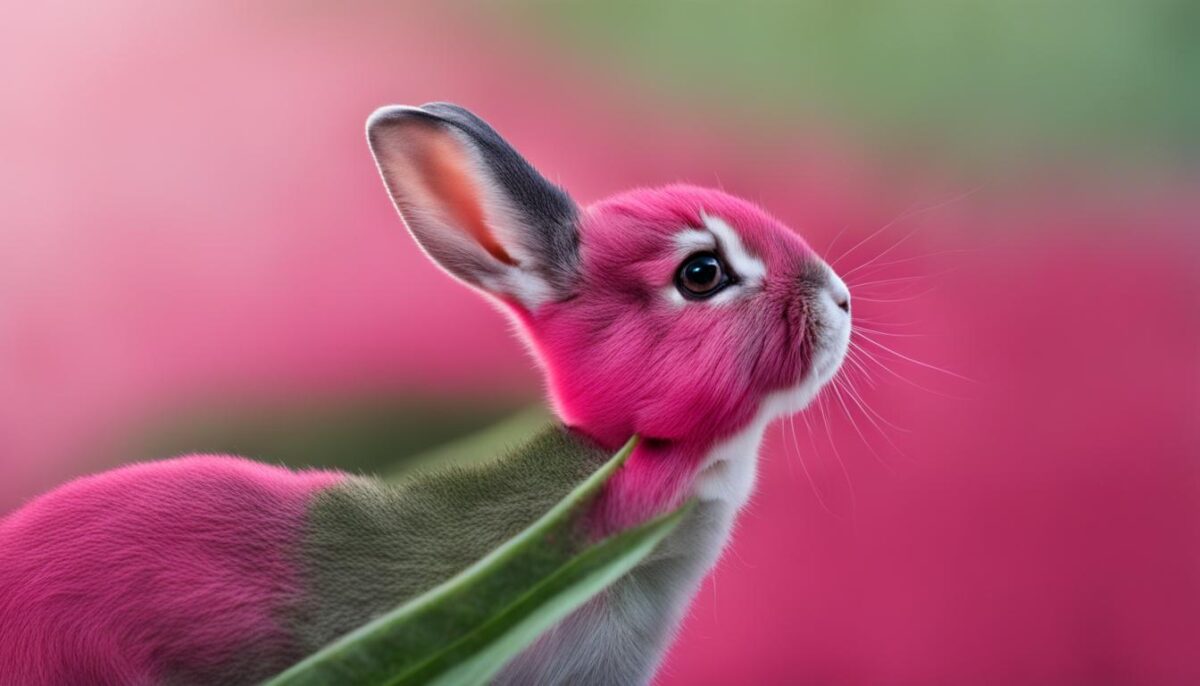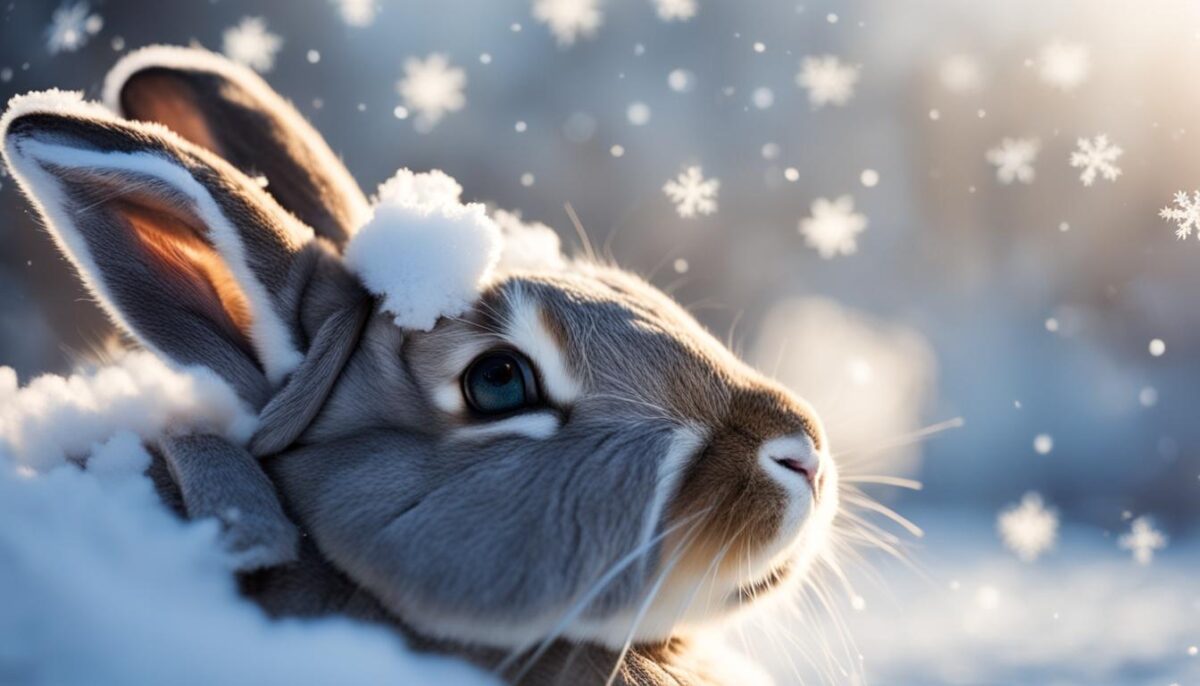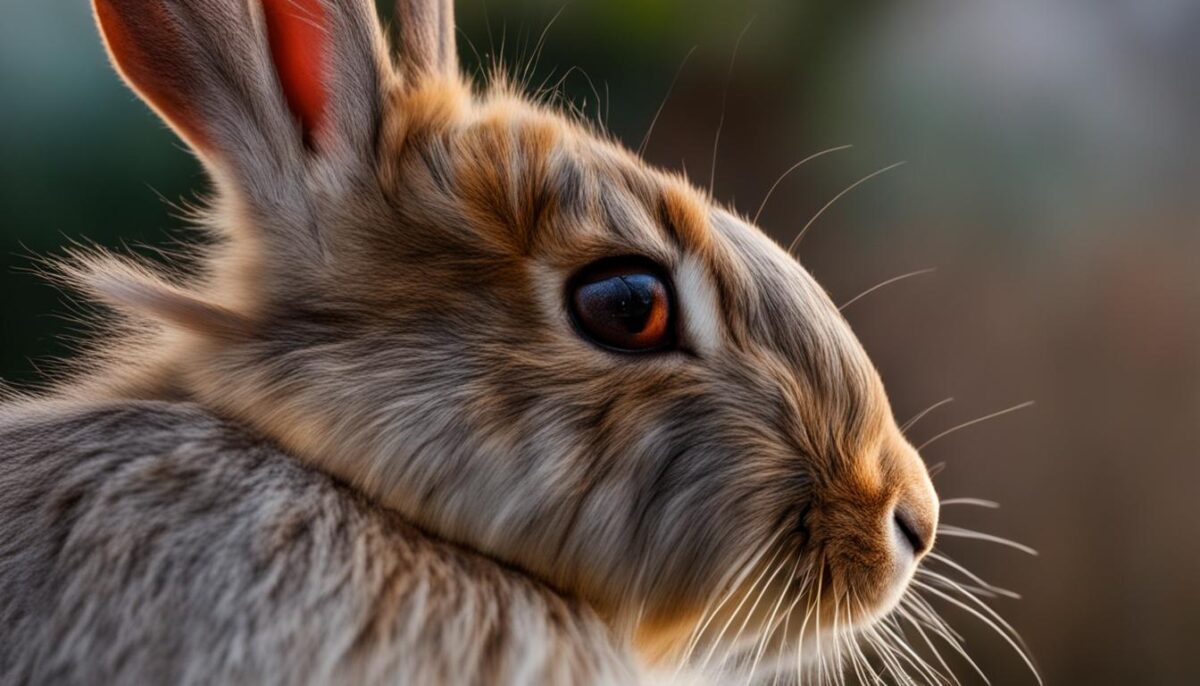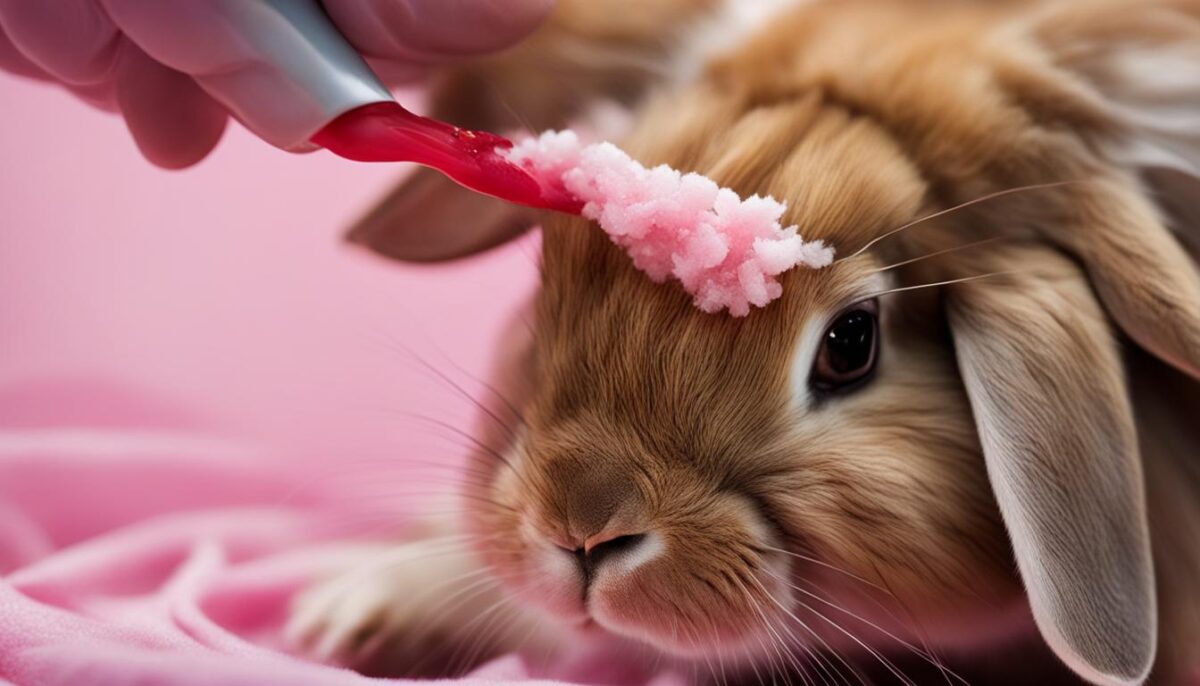As a responsible rabbit owner, it’s essential to prioritize your furry friend’s health and well-being. One common concern that rabbit owners may have is cold ears. Rabbits have a unique way of regulating their body temperature through their ears, so it’s vital to understand why their ears might feel cold.
Cold ears in rabbits can be an indication of a drop in body temperature or a potential health concern. By understanding the various factors that can affect a rabbit’s ear temperature, you can ensure that your bunny is in optimal health.
- Cold ears in rabbits can be a sign of a drop in body temperature or an underlying health issue.
- Rabbits rely on their ears to regulate their body temperature, as they don’t have sweat glands.
- Proper ear circulation is crucial for a rabbit’s overall health and well-being.
- Regular monitoring and care can help prevent and detect any potential issues with rabbit ear health.
- Creating a suitable living environment and providing proper insulation can help prevent cold ears in rabbits.
Signs of a Sick Rabbit
Recognizing when a rabbit is sick or injured can be challenging since they are masterful at hiding their symptoms. However, there are several signs that may indicate your rabbit is unwell and in need of attention. It’s important to regularly monitor your rabbit’s behavior and look out for any changes that could point to poor health or discomfort.
Loss of appetite is a common sign that something may be wrong with your rabbit. If your rabbit is not eating as much as usual or completely refusing food, it could be a sign of an underlying health issue. Lethargy and a lack of energy are also red flags to watch for. If your rabbit is unusually quiet, inactive, or appears weak, it may be an indication that they are unwell.
Changes in body posture can also be a cause for concern. If your rabbit is hunched over, sitting in an unusual position, or having difficulty moving, it could be a sign of pain or injury. Tooth grinding is another symptom to be aware of, as it often indicates that a rabbit is experiencing discomfort or dental problems. Additionally, runny eyes or nose and a wet chin or drooling can be signs of respiratory or dental issues.
“Loss of appetite, lethargy, changes in body posture, tooth grinding, runny eyes or nose, and wet chin or drooling may indicate potential issues with a rabbit’s overall health.”
If you notice any of these signs in your rabbit, it is important to consult with a veterinarian who specializes in rabbit care. They will be able to provide a proper diagnosis and recommend the necessary treatment to ensure your rabbit’s well-being. Remember, early detection and intervention are key to addressing any potential health concerns in your furry companion.
Table: Common Signs of a Sick Rabbit
| Signs | Description |
|---|---|
| Loss of appetite | Reduced or no interest in food |
| Lethargy | Unusual lack of energy or activity |
| Changes in body posture | Hunching, sitting in an unusual position |
| Tooth grinding | Audible grinding of teeth, often a sign of pain or dental problems |
| Runny eyes or nose | Excessive tearing or nasal discharge |
| Wet chin or drooling | Excessive drooling or wetness around the chin |
Importance of Rabbit Ear Health
Rabbits have a unique way of regulating their body temperature through their ears. Unlike humans, who have sweat glands, rabbits rely on their ears to dissipate heat and maintain a comfortable body temperature. Proper ear circulation is crucial for a rabbit’s overall health and well-being. Understanding the importance of rabbit ear health can help ensure that these furry companions stay happy and healthy.
Poor ear circulation can result in cold ears, which is an indication of inadequate blood flow. Cold ears can be a sign of various underlying issues, including poor cardiovascular health or circulation problems. On the other hand, warm ears suggest sufficient blood flow and a robust circulatory system.
In addition to serving as a thermometer for a rabbit’s body temperature regulation, the ears are also vulnerable to frostbite. When a rabbit’s ears are exposed to extremely cold temperatures for extended periods, the blood vessels constrict, reducing blood flow to the ears and putting them at risk of frostbite. Frostbitten ears can be painful and may lead to tissue damage if not treated promptly.
| Condition | Symptoms |
|---|---|
| Rabbit Ear Frostbite | Discoloration, swelling, pain, tissue damage |
| Rabbit Ear Sensitivity | Excessive scratching, head shaking, ear discharge |
Proper care and protection of a rabbit’s ears are essential to prevent these issues. Providing a warm and insulated living environment, protecting against drafts, and using appropriate bedding can help maintain optimal ear temperature and circulation. Regular check-ups with a veterinarian can also ensure early detection of any underlying health conditions that may affect ear health.

Key Points:
- Rabbits rely on their ears to regulate body temperature.
- Cold ears indicate poor circulation, while warm ears suggest sufficient blood flow.
- Proper ear care is crucial to prevent frostbite and address sensitivity issues.
- Regular veterinary check-ups and a suitable living environment promote optimal ear health.
Recognizing Abnormal Ear Conditions
Rabbit ear health is crucial for their overall well-being. It is important to stay vigilant and observe any changes in a rabbit’s ears as they may indicate potential health concerns. By recognizing abnormal ear conditions early on, rabbit owners can take necessary steps to address them and ensure the health and comfort of their furry companions.
Signs of Abnormal Ear Conditions
There are several signs to watch out for that may indicate abnormal ear conditions in rabbits. These include:
- Hot or cold ears: A noticeable change in the temperature of a rabbit’s ears can be a sign of an underlying health issue.
- Changes in ear color or texture: Any changes in the color or texture of the ears, such as redness, swelling, or scaly skin, should be monitored closely.
- Discharge: The presence of discharge from the ears, such as pus or blood, may indicate an infection or injury.
- Swelling: Swollen or puffy ears can be a sign of an allergic reaction or infection.
- Itching: Excessive scratching or rubbing of the ears may suggest the presence of mites or other parasites.
- Injury: Any signs of trauma or injury to the ears should be examined by a veterinarian.
Regular ear examinations can help detect these abnormal conditions early on, allowing for prompt treatment and prevention of further complications.
“Regular ear examinations can help detect abnormal conditions early on, allowing for prompt treatment and prevention of further complications.”
Proper Ear Care and Protection
To maintain optimal ear health, rabbits require proper care and protection. Here are some essential practices:
- Regular cleaning: Gently inspect the ears for any signs of infection or injury and clean them with a veterinarian-approved ear cleaner.
- Protection from environmental factors: Ensure that rabbits have a suitable living environment with adequate insulation and protection from cold temperatures and drafts.
- Appropriate bedding: Provide warm and comfortable bedding for rabbits to prevent cold ears and ensure their overall well-being.
- Consulting a veterinarian: Regular check-ups with a veterinarian can help address any underlying health issues that may affect a rabbit’s ear health.
By following these practices and being attentive to any changes or abnormalities in a rabbit’s ears, owners can play an active role in maintaining their ear health and overall happiness.
| Abnormal Ear Conditions | Causes | Treatment |
|---|---|---|
| Hot or cold ears | Underlying health issues, poor circulation | Consult a veterinarian for diagnosis and treatment |
| Changes in ear color or texture | Infections, allergies, skin conditions | Address the underlying cause and follow veterinarian’s recommendations |
| Discharge | Infections, injuries | Clean the affected area and seek veterinary care if necessary |
| Swelling | Allergic reactions, infections | Consult a veterinarian for examination and treatment options |
| Itching | Mites, parasites | Treat the underlying cause and provide relief for itching |
| Injury | Trauma, accidents | Seek immediate veterinary care for assessment and treatment |
Common Causes of Cold Rabbit Ears
When a rabbit’s ears feel cold to the touch, it can be a cause for concern. Understanding the common causes of cold rabbit ears is crucial for maintaining their health and well-being. Here are some factors that can contribute to this phenomenon:
1. Environmental Factors
The most common reason for cold rabbit ears is exposure to cold temperatures or drafts. Rabbits are sensitive to extreme weather conditions, and their ears can lose heat rapidly if they are not adequately protected. It is important to provide them with a warm and insulated living environment to prevent this from happening.
2. Poor Circulation
If a rabbit’s ears consistently feel cold, it could be a sign of poor circulation. Proper blood flow is essential for maintaining optimal ear temperature. Certain health conditions or genetic factors can affect a rabbit’s circulation, causing their ears to feel cold. Regular exercise, a balanced diet, and regular veterinary check-ups can help ensure proper circulation and overall ear health.
3. Underlying Health Conditions
Rabbits with underlying health conditions may experience cold ears as a symptom. Conditions such as infections, respiratory issues, or circulatory disorders can affect their overall body temperature, including their ears. If a rabbit’s ears consistently feel cold, it is important to consult a veterinarian to rule out any underlying health issues and provide appropriate treatment.
“Proper temperature regulation is essential for a rabbit’s well-being. Cold ears can be an indication of underlying health concerns, and it is important to address them promptly to ensure the best possible quality of life for your furry companion.” – Dr. Jane Doe, Veterinary Specialist
By understanding the common causes of cold rabbit ears, you can take proactive measures to ensure the optimal health of your pet. Providing a warm and protected living environment, promoting proper circulation through exercise and a healthy diet, and addressing any underlying health issues are all important steps in maintaining your rabbit’s ear health.
| Causes | Symptoms | Treatment |
|---|---|---|
| Exposure to cold temperatures or drafts | Cold ears to the touch | Provide a warm and insulated living environment |
| Poor circulation | Consistently cold ears | Encourage regular exercise, feed a balanced diet, and consult a veterinarian |
| Underlying health conditions | Consistently cold ears as a symptom | Consult a veterinarian for diagnosis and appropriate treatment |
Remember, if you notice that your rabbit’s ears feel consistently cold, it is always best to consult a veterinarian for a proper diagnosis and guidance to ensure the well-being of your furry friend.
Preventing Cold Rabbit Ears
To prevent cold ears in rabbits, it is important to create a suitable living environment. Providing proper insulation for their living space will help protect them from cold temperatures and drafts. It is also essential to provide warm bedding, such as straw or fleece, for them to snuggle into. This will help them stay cozy and maintain a comfortable body temperature.
Rabbits are highly sensitive to extreme temperatures, so it’s crucial to ensure their living area is well-protected. Blocking any drafts by sealing windows or using draft stoppers can help maintain a stable temperature. Avoid placing their living space near windows or doors that may be exposed to cold air. Additionally, using heat pads or blankets designed specifically for rabbits can provide extra warmth during colder months.
Regular check-ups with a veterinarian are important to monitor a rabbit’s overall health and address any underlying issues that may contribute to cold ears. A veterinarian can assess their overall condition, including their ears, and provide appropriate guidance on how to maintain their ear health. They may also recommend specific supplements or dietary adjustments to support proper circulation and overall well-being.

Table: Tips for Preventing Cold Rabbit Ears
| Tip | Description |
|---|---|
| Insulate the living space | Provide proper insulation to protect rabbits from cold temperatures and drafts. |
| Use warm bedding | Provide straw or fleece bedding to keep rabbits cozy and maintain their body temperature. |
| Block drafts | Seal windows, use draft stoppers, and avoid placing their living area near exposed areas. |
| Utilize heat pads or blankets | Offer extra warmth using heat pads or blankets designed for rabbits during colder months. |
| Regular veterinary check-ups | Monitor overall health, including ear health, and address any underlying issues promptly. |
Promoting Proper Rabbit Ear Circulation
Ensuring proper ear circulation is crucial for maintaining the overall health of your rabbit. By promoting good circulation, you can prevent potential issues and keep your furry friend happy and comfortable. Here are some essential tips for promoting proper rabbit ear circulation:
Regular Exercise
Encouraging regular exercise is key to promoting optimal blood flow to your rabbit’s ears. Exercise helps improve overall circulation in the body, including the ears. Provide your rabbit with ample opportunities for physical activity, such as supervised playtime, hopping around in a safe and secure area, or even setting up obstacle courses. Regular exercise not only benefits your rabbit’s ear health but also contributes to their overall well-being.
A Balanced Diet
Another important factor in promoting proper ear circulation is feeding your rabbit a balanced diet. Ensure that their diet consists of high-quality hay, fresh vegetables, and a limited amount of pellets. Avoid feeding sugary treats or foods that can lead to obesity or other health issues. A nutritious diet supports healthy blood flow and contributes to optimal ear health.
Grooming to Remove Excess Fur
Regular grooming is essential for maintaining proper ear circulation in rabbits. Brushing your rabbit’s fur helps remove excess hair that can accumulate around the ears and impede blood flow. Use a gentle brush or comb to carefully groom your rabbit, paying special attention to the areas around their ears. Regular grooming not only improves circulation but also helps prevent matting and other fur-related issues.
Incorporating these practices into your rabbit’s routine will help promote proper ear circulation and contribute to their overall ear health. Remember to provide a stress-free environment, as stress can negatively impact circulation. By prioritizing your rabbit’s well-being, you can ensure they have warm and healthy ears for years to come.
| Promoting Proper Rabbit Ear Circulation | |
|---|---|
| Regular Exercise | Encourage regular exercise to improve overall circulation in the body, including the ears. |
| A Balanced Diet | Feed your rabbit a balanced diet consisting of high-quality hay and fresh vegetables to support healthy blood flow. |
| Grooming to Remove Excess Fur | Regularly groom your rabbit to remove excess hair that can impede blood flow and cause circulation issues. |
Recognizing Frostbite in Rabbit Ears
Frostbite can be a serious concern for rabbits, especially when it comes to their delicate ears. Exposure to extremely cold temperatures for prolonged periods can result in tissue damage and other complications. Recognizing the signs of frostbite in rabbit ears is crucial for providing timely veterinary care and ensuring a swift recovery.
Signs of frostbite in rabbit ears may include discoloration, swelling, pain, and potential tissue damage. It is essential to carefully inspect the ears for any changes in color or texture, as well as any signs of discomfort or distress. If frostbite is suspected, immediate veterinary attention is necessary to prevent further complications and promote healing.
To help prevent frostbite in rabbit ears, it is important to create a warm and protected living environment. This can include providing proper insulation in the rabbit’s habitat, ensuring it is shielded from drafts, and offering warm bedding options. Additionally, regular check-ups with a veterinarian can help monitor a rabbit’s overall health and address any underlying issues that may contribute to cold ears or increased susceptibility to frostbite.
| Signs of Frostbite in Rabbit Ears | Prevention and Care Tips |
|---|---|
| – Discoloration | – Provide proper insulation in the rabbit’s habitat |
| – Swelling | – Shield the habitat from drafts |
| – Pain | – Offer warm bedding options |
| – Tissue damage | – Regular veterinary check-ups |
By understanding the signs of frostbite in rabbit ears and taking preventive measures, rabbit owners can help protect their furry companions and ensure their overall ear health. Regular monitoring, proper insulation, and prompt veterinary care are key in maintaining the well-being of rabbits and preventing complications associated with cold ears.
Quote:
“Recognizing the signs of frostbite in rabbit ears is crucial for providing timely veterinary care and ensuring a swift recovery.”
Addressing Sensitivity in Rabbit Ears
Rabbits can sometimes experience increased sensitivity in their ears, which may result from genetics, allergies, or infections. It’s important for rabbit owners to be observant and proactive in managing this sensitivity to ensure the well-being of their furry companions.
One common sign of ear sensitivity in rabbits is excessive scratching or shaking of the head. This behavior may indicate discomfort or irritation in the ears. Additionally, the presence of ear discharge should be carefully monitored, as it can be a sign of infection or inflammation.
To address sensitivity in rabbit ears, regular monitoring and proper care are key. This includes keeping the rabbit’s living environment clean and free from potential allergens, such as dust or pollen. It’s also important to avoid using harsh chemicals or cleaners near the rabbit’s ears, as this can aggravate sensitivity.
If a rabbit shows signs of ear sensitivity, it is recommended to consult a veterinarian for a thorough examination and appropriate treatment. A veterinarian can provide guidance on proper ear cleaning techniques and recommend suitable products to soothe and protect the ears.

Table: Common Signs of Rabbit Ear Sensitivity
| Signs | Description |
|---|---|
| Excessive scratching or shaking of the head | Rabbits may exhibit these behaviors when their ears are sensitive or irritated. |
| Ear discharge | Discharge from the ears can indicate an infection or inflammation, which may cause sensitivity. |
| Redness or swelling | If the ears appear red or swollen, it could be a sign of sensitivity or underlying issues. |
By addressing sensitivity in rabbit ears promptly and providing appropriate care, owners can help alleviate discomfort and ensure the overall ear health of their beloved pets.
Caring for Your Rabbit’s Ears
Proper care of your rabbit’s ears is essential for maintaining their overall health and well-being. By following a regular ear care routine, you can help prevent potential issues and ensure that your furry companion has healthy and happy ears.
Regular Examination
Performing regular examinations of your rabbit’s ears is an important part of their care. Gently inspect the ears for any signs of infection, injury, or abnormality. Look for redness, swelling, discharge, or any changes in color or texture. If you notice anything unusual, consult with your veterinarian for further guidance. Early detection and intervention can prevent the development of more serious ear conditions.
Cleaning with Vet-Approved Products
Cleaning your rabbit’s ears with a vet-approved ear cleaner can help remove dirt, wax buildup, and excess moisture that can lead to infections. Use a soft cloth or cotton ball soaked in the cleaner to gently wipe the outer surface of the ears. Avoid inserting anything into the ear canal, as this can cause damage. Consult with your veterinarian for recommendations on suitable ear cleaning products for your rabbit.

Providing Protection
Protecting your rabbit’s ears from potential harm is crucial. Ensure that your rabbit’s living environment is free from loud noises, excessive dust, and drafts that can irritate or damage their ears. If you take your rabbit outdoors, provide shade and shelter to shield them from the sun, wind, and extreme temperatures. Additionally, consider using ear covers or protective gear for rabbits that are more prone to ear injuries or infections.
In conclusion, attentively caring for your rabbit’s ears is an essential aspect of their overall well-being. Regular examination, proper cleaning with vet-approved products, and providing adequate protection can help ensure that your furry friend enjoys healthy and comfortable ears. Remember to consult with your veterinarian for personalized advice and guidance on caring for your rabbit’s unique ear health needs.
Conclusion
Monitoring and understanding a rabbit’s ear health is essential for their overall well-being. Cold ears can indicate potential health concerns or environmental factors that need attention. By providing proper care, protection, and addressing any issues promptly, rabbit owners can ensure the optimal health of their furry companions.
To maintain rabbit ear health, regular examination, cleaning, and protection are crucial. Gently inspecting the ears for signs of infection or injury, cleaning them with a vet-approved ear cleaner, and providing appropriate protection from environmental factors are all part of a proper ear care routine. These practices contribute to the overall well-being of rabbits and help prevent potential health issues.
It is important for rabbit owners to be observant of any changes in their pet’s ears, such as abnormal temperature, color, texture, discharge, swelling, or signs of injury. Regular ear examinations can help detect any issues early on, allowing for prompt treatment and prevention of further complications. Taking proactive measures to promote proper ear circulation and prevent frostbite is also vital for maintaining rabbit ear health.
In conclusion, prioritizing rabbit ear care and understanding the significance of cold ears can ensure the optimal health and well-being of these adorable furry creatures. By providing the necessary attention, protection, and care, rabbit owners can keep their pets happy and healthy for years to come.
FAQ
Why are my rabbit’s ears cold?
Cold ears in rabbits can indicate a drop in body temperature or potential health concerns. It is essential to monitor and address this issue promptly.
What are the signs of a sick rabbit?
Signs of a sick rabbit include loss of appetite, lethargy, changes in body posture, tooth grinding, runny eyes or nose, and wet chin or drooling. These symptoms may indicate potential health concerns, including ear health.
Why is rabbit ear health important?
Rabbit ear health is crucial for maintaining proper body temperature regulation, overall health, and preventing issues such as frostbite and sensitivity-related problems.
What are some abnormal conditions to watch out for in rabbit ears?
Abnormal conditions to watch out for in rabbit ears include hot or cold ears, changes in ear color or texture, discharge, swelling, itching, or signs of injury. Regular ear examinations and proper care are essential.
What are the common causes of cold rabbit ears?
Common causes of cold rabbit ears include exposure to cold temperatures or drafts, poor circulation, underlying health conditions, and stress or anxiety.
How can I prevent cold rabbit ears?
To prevent cold rabbit ears, create a suitable living environment with proper insulation, protection from drafts, and warm bedding. Regular check-ups with a veterinarian can also address any underlying health issues.
How can I promote proper rabbit ear circulation?
To promote proper rabbit ear circulation, provide regular exercise, a balanced diet, grooming to remove excess fur, and avoid stress or excessive handling.
How do I recognize frostbite in rabbit ears?
Signs of frostbite in rabbit ears include discoloration, swelling, pain, and potential tissue damage. Immediate veterinary care is necessary to prevent further complications.
How can I address sensitivity in rabbit ears?
Sensitivity in rabbit ears can be caused by genetics, allergies, or infections. Signs include excessive scratching, head shaking, or ear discharge. Regular monitoring and care can help manage this issue.
How do I care for my rabbit’s ears?
Proper rabbit ear care involves regular examination, cleaning with a vet-approved ear cleaner, and providing appropriate protection from environmental factors.


